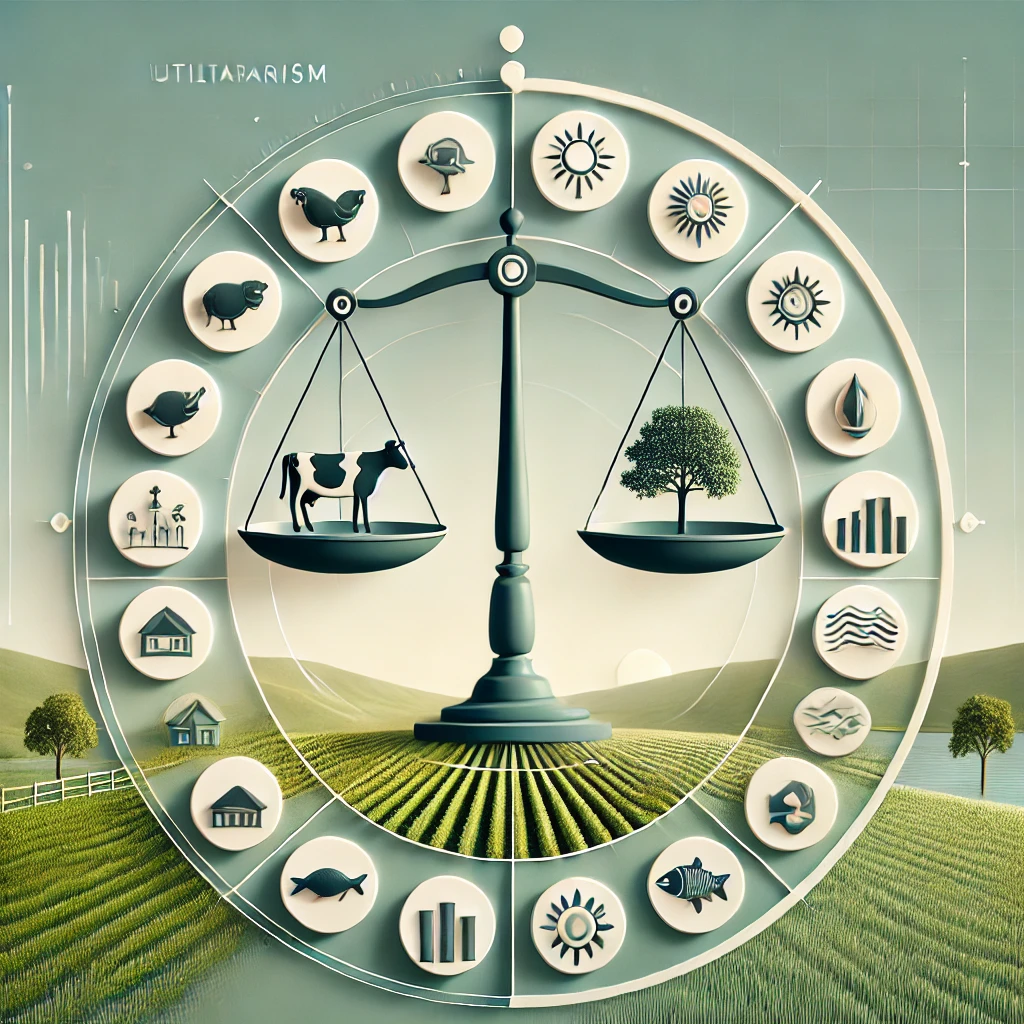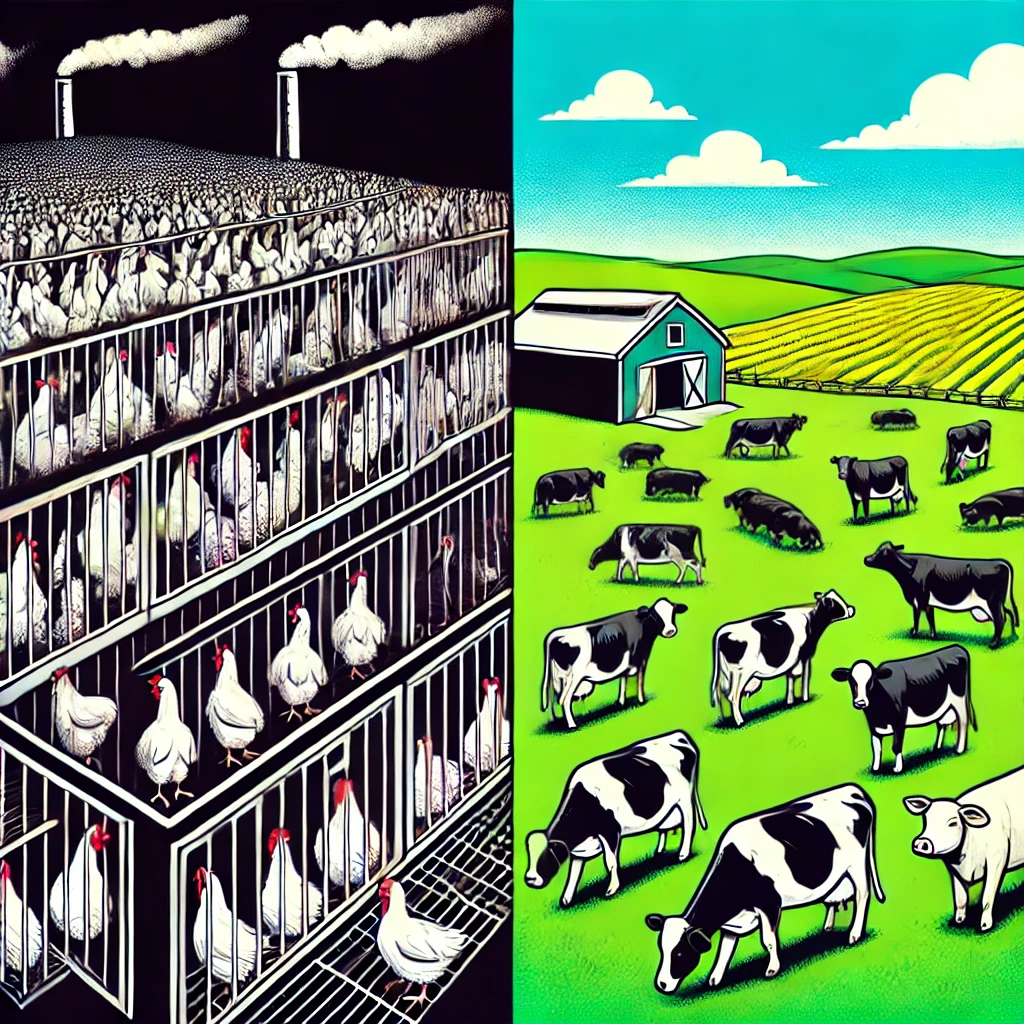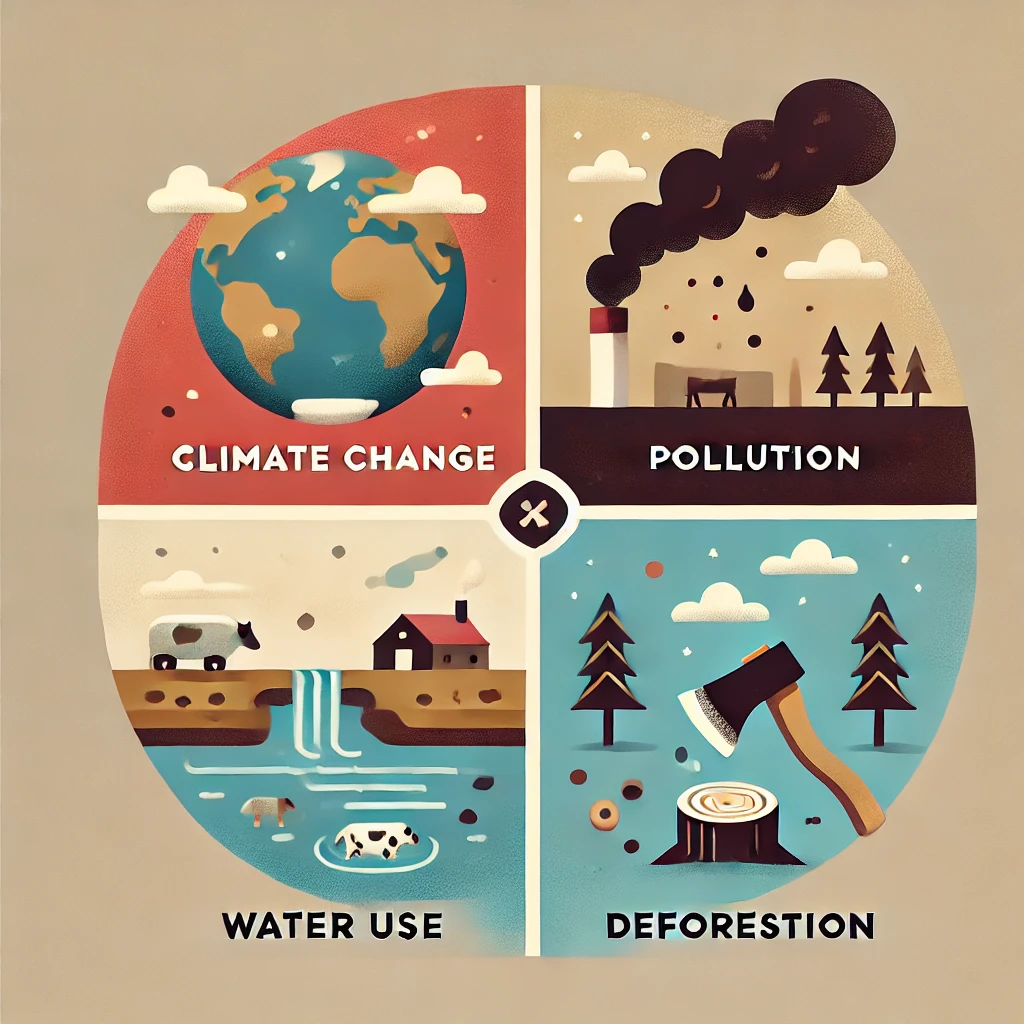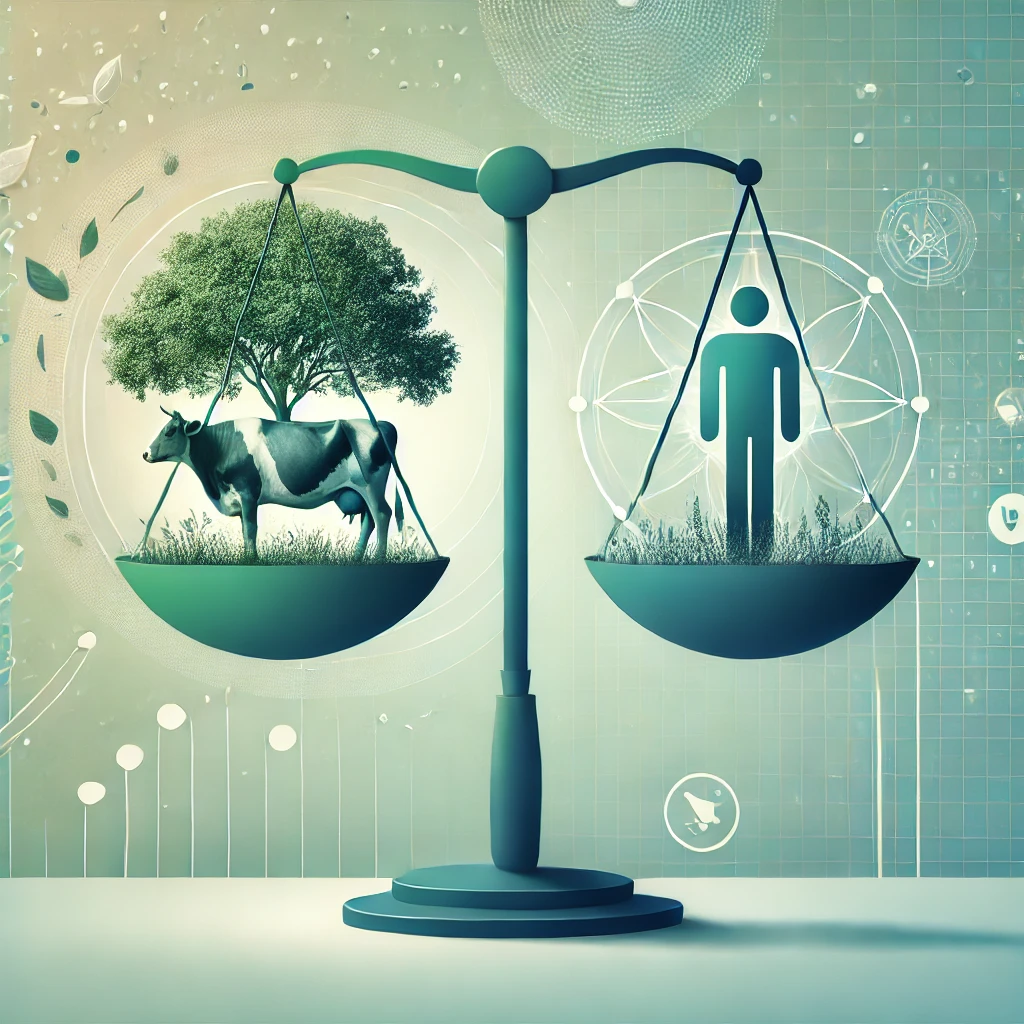
Introduction
The consumption of animal products has long been a cornerstone of human culture, often accepted without question. Yet, in an era increasingly shaped by ethical considerations and environmental awareness, the concept of ethical animal consumption invites us to reevaluate this practice. Industrial farming raises profound concerns about animal welfare, ecological degradation, and public health, presenting an urgent need for change. By embracing utilitarian ethics—focused on minimizing suffering and maximizing well-being—we can reshape our food systems to prioritize compassion and sustainability, paving the way for a more harmonious coexistence between humans, animals, and the planet.
The Hidden Suffering in Animal Agriculture

Industrial farming systems, also known as factory farming, are large-scale operations designed to maximize efficiency and profit in producing animal products. These systems often prioritize output over the well-being of the animals, leading to overcrowded living conditions, routine use of antibiotics, and inhumane practices. Such setups minimize space, restrict movement, and use intensive breeding techniques that can cause significant physical and psychological harm to the animals.
Industrial farming systems subject billions of animals to conditions that cause immense suffering. Chickens, pigs, cows, and fish, among others, endure overcrowding, genetic manipulation, and inhumane handling practices. For example:
Chickens
raised for meat often live in overcrowded sheds, with each bird allocated a space no larger than a sheet of paper. This severe confinement prevents natural behaviors like spreading their wings or dust bathing, leading to chronic stress, injuries, and weakened immune systems. Egg-laying hens are subjected to painful beak trimming to prevent pecking injuries caused by stress and frustration. These hens spend their lives in cramped battery cages, where they cannot move freely, often developing brittle bones and other health issues from lack of exercise.
Pigs
endure severe confinement, often spending their lives in metal gestation crates so small that they cannot turn around or lie comfortably. This extreme restriction prevents them from engaging in natural behaviors like rooting or exploring, leading to intense psychological stress and physical deterioration. Female pigs are repeatedly impregnated, and their piglets are subjected to painful procedures such as tail docking, tooth clipping, and castration—all performed without anesthesia. These practices not only cause immediate pain but also expose the animals to chronic infections and long-term suffering.
Cows
bred for dairy production endure repetitive artificial insemination every year to maintain milk production. This cycle not only subjects them to physical discomfort but also severe emotional distress. Calves are forcibly separated from their mothers within hours of birth, a practice that causes vocalizations of distress from both mother and offspring. Female calves are often raised to repeat this cycle, while male calves, considered less profitable, are sold for veal or left to die. These conditions strip cows of their natural maternal bonds and subject them to a lifetime of exploitation.
Fish
meanwhile, face unique suffering depending on the method of production:
Commercial Fishing: Wild-caught fish endure prolonged struggles in massive nets, often being crushed under the weight of other fish. They may die from suffocation, injuries during handling, or exposure to air as they are hauled aboard fishing vessels. Slaughter methods, such as asphyxiation, decapitation, or live gutting, frequently occur without stunning, inflicting immense suffering and prolonging the agony of these animals.
Aquaculture (Fish Farming): Fish are confined to overcrowded tanks or cages in which they cannot swim freely. This overcrowding causes chronic stress, injuries from constant contact with other fish and the enclosure, and a rapid spread of diseases. The conditions often result in behavioral abnormalities and high mortality rates. To minimize contamination before slaughter, fish are commonly starved for several days, exacerbating their suffering.
Both methods reflect the often-overlooked cruelty inherent in seafood production, further emphasizing the ethical costs of prioritizing efficiency over welfare.
These practices reveal the ethical cost of prioritizing efficiency and profit over animal welfare.
Environmental Consequences of Animal Agriculture

Animal agriculture is a leading contributor to environmental degradation. However, these impacts are often overlooked or underestimated due to the indirect nature of their effects. Many consumers are disconnected from the production processes and unaware of how livestock farming contributes to climate change, deforestation, water overuse, and pollution. Additionally, the normalization of animal agriculture in society and the lack of transparency from industries perpetuate a lack of public awareness. These hidden costs emphasize the importance of critically examining the broader implications of our dietary choices.
Key Impacts:
Climate Change:
Livestock production accounts for significant greenhouse gas emissions. Methane, released during the digestive process of ruminants like cows, is over 25 times more potent than carbon dioxide in trapping heat in the atmosphere. Additionally, nitrous oxide from manure management and synthetic fertilizers further exacerbates climate change. These emissions, combined with the scale of livestock farming globally, make it one of the largest contributors to greenhouse gases.
Deforestation:
Vast areas of forests, particularly in the Amazon, are cleared to make way for grazing pastures and feed crop plantations such as soy. These activities displace indigenous communities, destroy habitats, and drive countless species to extinction. The loss of biodiversity disrupts ecosystems, weakening their resilience to environmental changes. Furthermore, deforestation contributes significantly to carbon emissions, as the removal of trees reduces the planet’s capacity to absorb atmospheric CO2, accelerating climate change.
Water Use:
Producing a single kilogram of beef requires over 15,000 liters of water, encompassing water used for growing feed crops, drinking water for livestock, and processing. This vast amount of water far exceeds the water footprint of plant-based foods, such as vegetables or grains. Furthermore, the inefficiency of water use in meat production highlights a critical imbalance: while millions face water scarcity globally, significant quantities are funneled into animal agriculture, emphasizing the need for sustainable dietary choices.
Pollution:
Waste from animal farming significantly impacts the environment in multiple ways. Manure runoff contaminates water sources, leading to algal blooms and dead zones that devastate aquatic ecosystems. Ammonia emissions from animal waste contribute to air pollution, which can cause respiratory problems in nearby communities. Excessive use of fertilizers and pesticides for growing animal feed further degrades soil quality, creating long-term damage to agricultural land. Together, these forms of pollution highlight the unsustainable nature of intensive animal farming and its widespread ecological consequences.
The Utilitarian Argument

Utilitarianism, a philosophy championed by thinkers like Jeremy Bentham and Peter Singer, is grounded in the principle that the morality of an action depends on its consequences. It emphasizes the ‘equal consideration of interests,’ arguing that the capacity to experience pleasure or pain—not factors like species membership—determines moral worth. This means that the suffering of a cow or a fish matters just as much as human suffering if the pain is of a similar magnitude.
The thesis explores utilitarianism through two significant approaches:
- Hedonistic Utilitarianism: This perspective focuses on maximizing pleasure and minimizing pain. It argues that the immense suffering endured by animals in industrial agriculture is unjustifiable, especially when alternatives exist that cause significantly less harm.
- Preference Utilitarianism: This approach considers the preferences or interests of all sentient beings, human and non-human alike. For instance, a pig’s preference to roam freely or a chicken’s need to engage in natural behaviors should be weighed equally against human preferences for convenience or taste.
Utilitarianism challenges human-centered ethics, urging us to include animals in our moral considerations.
Alternatives: Vegetarianism and Veganism
Shifting to plant-based diets offers a practical solution to the ethical and environmental challenges posed by animal agriculture. These diets:
- Reduce Suffering: Eliminating or minimizing animal product consumption directly reduces demand for industrial farming.
- Protect the Environment: Plant-based foods have significantly lower carbon footprints and resource requirements.
- Promote Health: A well-planned plant-based diet supports overall health and reduces the risk of chronic diseases.
Starting small, like incorporating plant-based meals weekly, can make a big difference.
Taking Action
Every action counts toward a more compassionate world.
- Start Small: Incorporate one or two plant-based meals per week. Experiment with plant-based proteins like lentils, chickpeas, or tofu to discover what works for you.
- Educate Yourself: Learn about the environmental and ethical implications of food choices. Documentaries, books, and online resources can provide valuable insights.
- Support Sustainable Practices: Choose products labeled as ethically sourced, organic, or cruelty-free when shopping.
- Advocate for Change: Engage with organizations promoting animal welfare or environmental sustainability. Share information with friends and family to raise awareness.
- Focus on Progress, Not Perfection: Mistakes are part of the process. Celebrate small victories and keep striving for a more compassionate lifestyle.
These steps help bridge the gap between awareness and action, empowering you to make meaningful contributions toward reducing suffering and promoting a sustainable future.
Ethical living doesn’t require perfection; it starts with small, intentional changes. Begin by incorporating more plant-based meals into your diet, supporting sustainable food systems, and advocating for policies that prioritize animal welfare and environmental protection.
Conclusion
The utilitarian ethics of consuming animal products challenges us to rethink our dietary choices. By embracing practices that reduce suffering and promote sustainability, we can align our actions with the principles of compassion and well-being. Each choice we make has the potential to contribute to a kinder, healthier world.
Bibliography
Recommended Reads: Some of the links in this section are affiliate links. If you purchase a book through these links, I may earn a small commission at no extra cost to you. This helps support the blog and allows me to continue creating content. Thank you for your support!
- Contreras Narváez, Alejandro. La Ética Utilitarista de Consumir Productos de Origen Animal. Pontificia Universidad Javeriana, 2011.
- Singer, Peter, and Jim Mason. The Ethics of What We Eat: Why Our Food Choices Matter. Rodale Books, 2006.
- Singer, Peter. Practical Ethics. 3rd ed., Cambridge University Press, 2011.